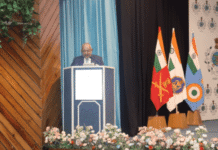Sri Vijaya Puram: In a move aimed at enhancing the quality and credibility of laboratory practices in the Andaman and Nicobar Islands, the ICAR-Central Island Agricultural Research Institute (ICAR-CIARI), in collaboration with the National Accreditation Board for Testing and Calibration Laboratories (NABL), hosted a comprehensive awareness program on NABL accreditation at its Sri Vijaya Puram campus.
Held earlier this week, the program brought together researchers, industry professionals, academic representatives, and regulatory personnel from across the islands. The initiative was designed to familiarize participants with the intricate process of obtaining NABL accreditation and to stress its relevance in strengthening scientific output, regulatory compliance, and international recognition of laboratory work.
The session commenced with a welcome address by Srikanth R., Director of the QCI-NABL Regional Office. Setting the tone for the day, he outlined the broader goals of the accreditation initiative and emphasized the growing need for quality systems in the Indian laboratory ecosystem.
In the inaugural address, Dr. Eaknath B. Chakurkar, Director of ICAR-CIARI, drew attention to the role of accredited laboratories in building public trust and ensuring data accuracy in scientific research. “With advancements in science and technology, laboratories can no longer operate in isolation. Accreditation ensures that they meet both national expectations and international benchmarks,” he said.
A detailed keynote presentation followed, led by Sreeram Pinnamaraju, Assistant Director at QCI-NABL Regional Office. He explained the procedural steps involved in laboratory accreditation and offered practical insights on implementation challenges and solutions. Pinnamaraju also highlighted how NABL’s systems align with ISO/IEC 17025 standards, which are globally recognized for competence in testing and calibration laboratories.
The interactive session attracted around 50 participants from various sectors and institutions spread across the Andaman Islands. Attendees included lab managers, academic researchers, technical officers, and students eager to understand how global quality standards could be adopted and sustained in local laboratories.
Throughout the event, speakers stressed that NABL accreditation is not just a certificate but a systematic commitment to quality control, continuous improvement, and organizational transparency. Participants were informed that accredited labs often experience increased funding opportunities, easier regulatory clearances, and wider collaboration prospects with international agencies.
One of the major takeaways of the event was the emphasis on documentation, equipment calibration, staff competency, and internal audit procedures, pillars of the NABL accreditation framework. Speakers reiterated that adherence to these criteria ensures not only data accuracy but also boosts institutional reputation and stakeholder confidence.
The event concluded with a vote of thanks by Dr. Rafeeque R. Alyethodi, Senior Scientist at ICAR-CIARI. He expressed gratitude to the resource persons, institutional representatives, and attendees for their active participation and highlighted that the program was a stepping stone toward broader engagement with quality assurance practices in the islands.
Stakeholders who attended the program viewed it as a timely and critical initiative. “This kind of platform helps us understand what is needed to bring our laboratories up to national and global standards,” said one participant from a regional academic institution.
The awareness program marks a crucial push in the direction of strengthening laboratory infrastructure and credibility in the Andaman and Nicobar Islands. As the region expands its scientific and industrial capacities, adherence to accredited practices is expected to become a cornerstone of operational excellence.
With increasing emphasis on data integrity, regulatory compliance, and international collaboration, such capacity-building initiatives could help laboratories in remote regions not just catch up, but lead the way in quality-centric innovation.





